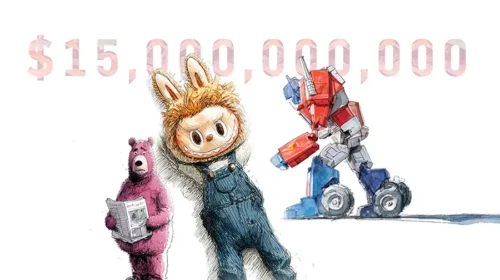Ninja Turtles slowdown breaks Playmates two-year winning streak

The storied Hong Kong toymaker said its revenues and profit before income tax fell by 16% and 32% last year, respectively
Key Takeaways:
- Playmates Toys said its revenue and profit both fell by double-digit amounts last year, sending its shares down by 3.3%
- Inflation worries in its major U.S. market hit sales of its mainstay Teenage Mutant Ninja Turtles toys in the second half of last year
By Edith Terry
Toys may be playthings for kids, but for Playmates Toys Ltd. (0869.HK) they’re serious business. So when the storied Hong Kong toymaker warned last week of big declines in its profit and sales last year, investors took note – especially after the company reported robust results in 2023 and the first six months of last year.
Specifically, Playmates warned that it would report a 16% revenue decline to HK$931 million ($119.5 million) in 2024 from HK$1.1 billion in 2023, as its annual profit before income tax sank by an even larger 32% to HK$178 million from HK$261 million.
The toy industry is notoriously competitive and reliant on the year-end holiday season, which is when Playmates’ revenue slowdown seems to have occurred. The company’s revenue plunged 36.2% in the second half of the year to HK$468 million, reversing a 28% rise in the first half, according to calculations using data from its latest warning and earlier midyear results.
Playmates blamed the weak results on a slowdown in shipments of its core Teenage Mutant Ninja Turtles franchise and price discounting by retailers during the holiday season. The company said sales of Teenage Mutant Ninja Turtles toys were boosted in 2023 by release of the latest movie in the franchise, “Teenage Mutant Ninja Turtles: Mutant Mayhem,” leading to a relative fall-off in sales last year.
The announcement also noted increased marketing and administrative expenses, offset in part by positive contributions from its Godzilla x Kong product line, buoyed by the March 2024 release of “Godzilla x Kong: The New Empire.”
Shareholders were predictably unhappy about the bad news, sending Playmates’ stock down by 3.3% in the week after the announcement. The last time Playmates reported similarly bad news was two years earlier, when its revenue fell by 20% and profit fell by nearly 80% in 2022.
After that, Playmates was on a winning streak for the next year and a half, led by a huge 120% revenue increase in 2023, with profit up by 23 times that year. Playmates’ results for the first half of last year continued the growth streak with 28% year-on-year revenue growth. Profit also continued to grow during the six-month period, but by a slower 5%.
Even as the company’s business continued to grow, it warned of building headwinds. “Looking forward to the second half of 2024, the cumulative impact of inflation over the past few years will continue to stretch household budgets across many markets around the world and lead to increasingly value conscious purchasing,” the company said in its midyear report in August. According to research group Circana, U.S. toy sales remained flat between 2023 and 2024, at $28 billion.
Worthy opponent
With consumer spending uncertain and prices likely to rise with the rollout of new U.S. tariffs aimed at China, what lies ahead for Playmates? The company’s fate is closely tied to the Teenage Mutant Ninja Turtles franchise, which burst onto the comics scene four decades ago in 1984. Playmates bought the worldwide master toy licenses for the franchise in 1987, and its fortunes took off in tandem with the turtles.
Teenage Mutant Ninja Turtles is still a worthy opponent among its peers, selling 300,000 comics last year and inspiring seven feature films through its 40th anniversary. But Playmates’ major market, the U.S., now looks uncertain for China and Hong Kong-based suppliers. The U.S. accounted for 70% of the company’s revenue in the first half of last year, and Donald Trump’s recent imposition of 10% tariffs on all Chinese imports, which took effect on the same day as the profit warning, could have a major impact on toys that are highly price-sensitive.
Competitor Bloks Group (0325.HK), a licensor of toys based on the Ultraman and Transformer franchises, is less vulnerable because it mostly sells to China. Like Playmates, Bloks reported strong revenue growth in 2023 and the first half of last year, even as it lost money. Despite those losses, the company’s strong growth prospects drew droves of investors to its Hong Kong IPO last month, helping it raise HK$1.6 billion.
Bloks shares surged in their trading debut and are still up nearly 50% from their IPO price. Its price-to-sales (P/S) ratio of 12.84 looks far healthier than Playmates’ meager 0.57, showing investors prefer Bloks’ reliance on China for both production and sales of its toys, despite the nation’s own building economic slowdown.
Playmates is a Hong Kong legend from the days when the city was a manufacturing powerhouse. Founder Chan Tai-ho was among the first to outsource production to China, and the company’s booming sales once made its stock as popular as blue chips like Jardine Matheson and Cheung Kong. It started setting up a U.S. distribution network for its dolls and preschool toys under the Playmates brand name starting in 1978, and four years later established a U.S. headquarters in El Segundo, California, the same hometown as Barbie maker Mattel (MAT.US), a major client. Its parent, Playmates Holdings (0635.HK), became the first Hong Kong toy company to list on the Hong Kong Stock Exchange in 1984.
A Chinese proverb says that family businesses seldom last beyond the third generation of their founders, which is where Playmates now stands in generational terms. The company’s current Chairman Michael Chan Kwong Fai is a grandson of founder Chan Tai-ho. Educated at Yale, the younger Chan was appointed chairman in December 2021, following a previous stint at private equity giant KKR.
If Playmates Toys is troubled, parent Playmates Holdings looks even worse. The parent company’s revenue increased by 23% to HK$526 million in the first half of last year, mostly thanks to contributions from its toy subsidiary. But it swung into the red over that time, mainly due to weakness in Hong Kong’s real estate market that is its other main business area.
This makes Playmates Holdings a victim of Hong Kong’s property downturn, since nearly all its investment is based in Hong Kong, including its Toy House headquarters building at 100 Canton Road. That reliance on property bodes poorly for the family business as the third generation takes over, since the slump looks unlikely to ease anytime soon. The toy business was a potential bright spot for Playmates in that gloomier picture, though even that could now be threatened by the looming U.S.-China trade war.
To subscribe to Bamboo Works weekly free newsletter, click here





